By Eric Vandenbroeck and
co-workers
Beyond the First World War
It is generally
accepted that the First World War which at the time was seen as a clash of civilizations
and a contest of rival national values still reverberates today. With some
important centennials coming up like (already in the course of 2019 used in the
rhetoric by Prime Minister Viktor Orban) the Treaty of Trianon on 4 June 2020
and (which among others provided for an autonomous Kurdistan) the Treaty of Sèvres on10 August 2020
new complex patterns and alliances were formed many of them who found
themselves at each other’s throats as they struggled with competing claims and
expectations. With some important centennials coming up like (already in the
course of 2019 used in the rhetoric by Prime Minister Viktor Orban) the Treaty
of Trianon on 4 June 2020 and (which among others provided for an autonomous Kurdistan) the Treaty of Sèvres
on 10 August 2020 with the Ottoman Empire, which subsequently as we will see
underneath was superseded by the Treaty of Lausanne made on June 24, 1923, with
the new Republic of Turkey. Here many new complex patterns and alliances were
formed many of them who found themselves at each other’s throats as they
struggled with competing claims and expectations including the fact that a
number of centennials will add more to the discussion as to how the war ended.
Not to mention that President Erdoğan seeks revisions in the Treaty of Lausanne
by
2023 due to what he claims to be secret articles signed by Turkish and
British diplomats at a Swiss lakefront resort almost a century ago.
But, as we will see
no region, was more affected or its geography changed as the Middle East. Of
course, in 1914-18 participants in the Middle East had their own reasons for
entering the conflict: the British fought to secure the
Suez canal and the Gulf oilfields; the Turks
feared Russian encroachment and hoped to regain territory lost before the great
war; the Germans sought to destabilize the British empire, the Russians coveted
Istanbul and Anatolia.
Following the rebellion sparked by the Hussein-McMahon
correspondence; the Sykes-Picot agreement; and
memoranda such as the Balfour Declaration the at
first British (closely followed by the French) in
1918 became very influential in the Middle East.
The discussions
between the British and the French who would control what following the break down of the Ottoman Empire in the Middle East would reach a fever pitch during the Versailles deliberations.
What is more, as we
will see underneath Turkish pundits today are looking ahead to more serious
foreign-policy challenges, like what will happen in 2023 when the Treaty of
Lausanne expires and Turkey’s modern borders become obsolete. In keeping with
secret articles signed by Turkish and British diplomats at a Swiss lakefront
resort almost a century ago, British troops will reoccupy forts along the
Bosphorus, and the Greek Orthodox patriarch will resurrect a Byzantine
ministate within Istanbul’s city walls...
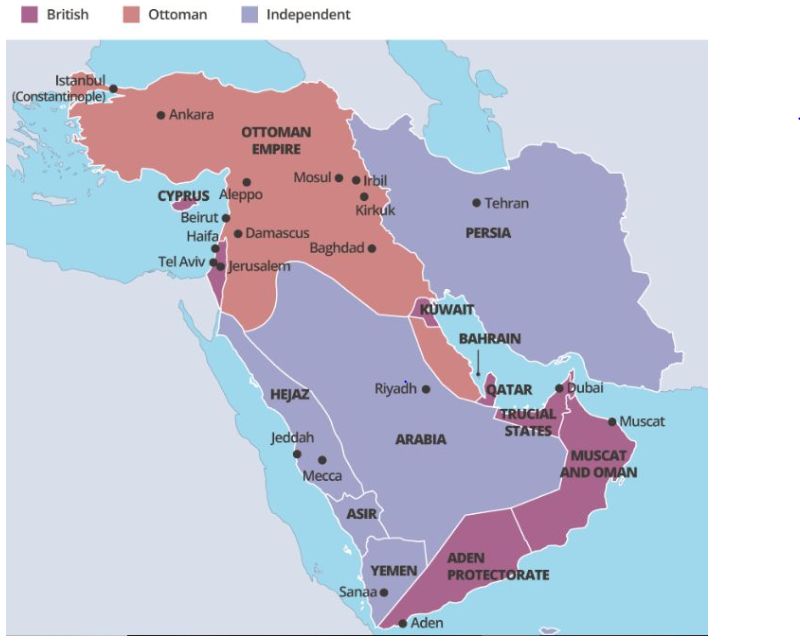
We know that the First World War was begun with high expectations of
rapid victory. And although many military thinkers feared that a major war
between the Great Powers might prove to be a drawn-out affair, they were
outnumbered by those who believed that offensive tactics would allow for a
swift victory. Instead, the continent was condemned to a drawn-out war of
attrition that ended with the three great empires that dominated Central and
Eastern Europe – Germany, Austria-Hungary, and Russia – all being destroyed and
replaced by republics. From their peripheral fragments were born the states
that formed complex new patterns and alliances. As has been described, many of
these found themselves at each other’s throats as they struggled with competing
claims and expectations.
The exhausted Western
Powers were in no mood to allow the disputes between the new states of Europe
to erupt into wars that might plunge the continent back into a global conflict.
Although France, Britain, and the United States continued to maintain powerful
navies and the capacity to field large armies, there was no appetite whatsoever
for war, not least because there remained fears that Bolshevism might spread
beyond Russia. The remaining Great Powers were acutely aware that the Russian
Revolution had grown out of Russia’s disastrous performance in the war, and no
nation wished to risk finding itself drawn into a conflict that might end in
the same manner. Instead, the countries of Western Europe all hoped that fear
of future world conflict and the intervention of the new League of Nations
would be sufficient to ensure at least a generation of peace.
Ethnicities and
nationalities had played a large part in the conflict between the three
empires. The spark that ignited Europe – the assassination of Franz Ferdinand
and his wife Sophie – was the result of tensions in
the Balkans, where the Serbs aspired to create a South Slav state under
their control. The entire Austro-Hungarian Empire struggled in vain to keep its
multitudinous nationalities under control, and the lack of any collective sense
of identity or loyalty ensured that it was the first empire where centrifugal
forces combined with war-weariness to create widespread unrest. Nevertheless,
despite these internal pressures and the general expectations that the Dual
Monarchy was an institution with no future, Habsburg rule outlasted that of the
Romanovs in Russia and the Hohenzollerns in Germany.
French
map from the early 1900s, for example, shows the population by ethnicity inside
the Austrian Hungarian Empire:
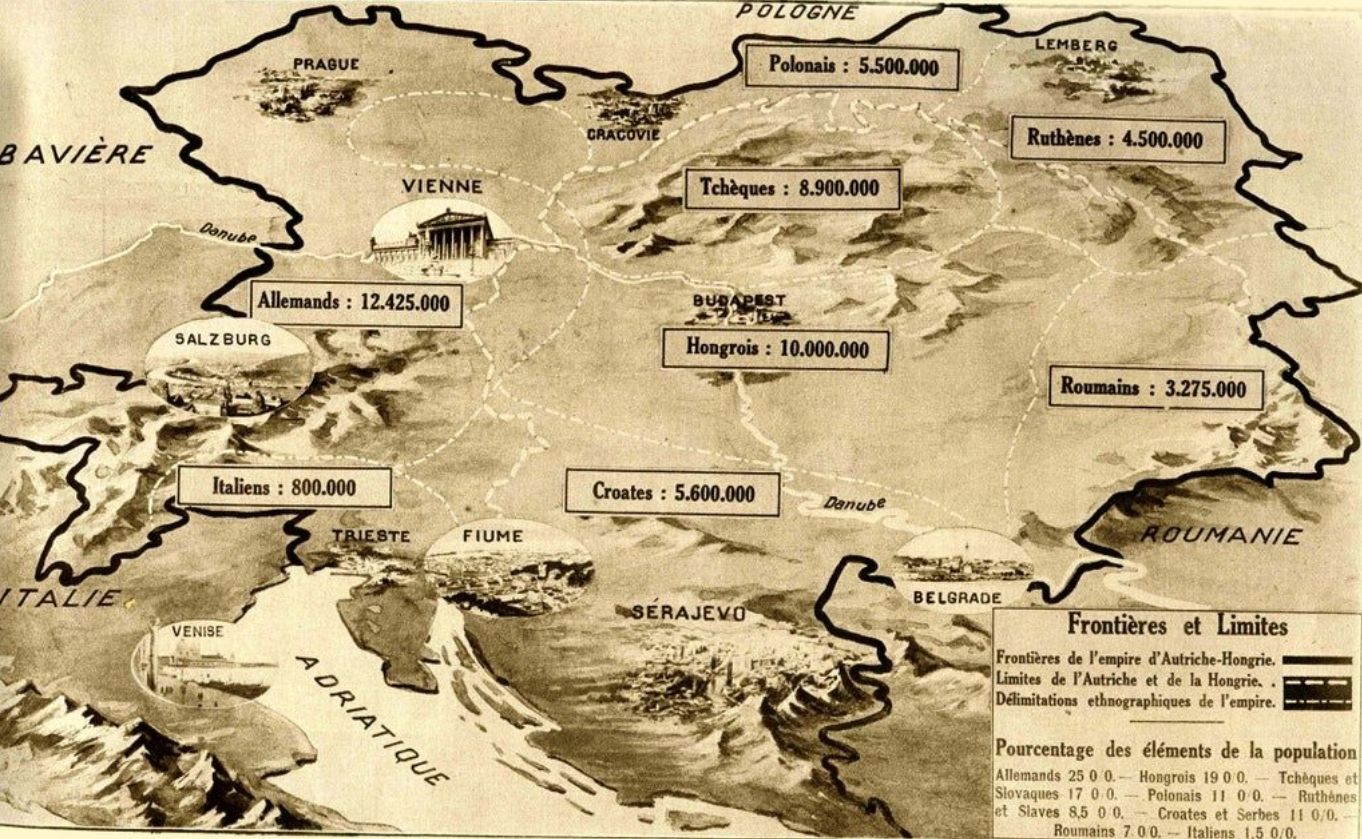
As Europe settled
down to its new national structures, it was inevitable that many people would find themselves on the wrong side of
the new borders that were often created in haste, or with no regard for the
realities on the ground. Whatever high-minded principles might have led to
Wilson’s insistence on the rights of the peoples of Europe to
self-determination, the fact was far untidier than he might have expected. The
decades of imperial rule had not required different nationalities within any
individual empire to live apart, and while there had been friction between the
different groups, their new status within the modern nations of Europe raised
this to new levels.
The greatest
territorial loser in the rearrangement of Europe was the Austro-Hungarian
Empire, which ceased to exist altogether. The Italians were awarded territories
along their border, completing their long-held dreams of uniting all the lands
that they regarded as Italian; the Balkan parts of the empire were largely
incorporated into the new Yugoslavia; Hungary was forced to concede
Transylvania to Romania; Bohemia and the Carpathian region broke away as the new state of Czechoslovakia; and much of Galicia was
absorbed by Poland. Hungary and Austria became separate states, and in a
remarkably short period, Vienna was changed from the center of a sprawling
empire that stretched from the Swiss border as far as the Ukrainian steppes
into the capital of a relatively small nation in Central Europe. It is a
measure of how inevitable the end of Habsburg rule had seemed for many years
that few Austrians showed any sense of hankering after past glories.
Russia entered the
war under the control of the tsars and ended it under
Bolshevik rule. In absolute terms, its loss of territory – Finland, the
Baltic States, and Poland – was modest, but these regions included some of its
most important economic and industrial centers, particularly Riga. Although exhaustion
brought the series of wars that followed the withdrawal of German forces to an
end, few in the region believed that the Russians had genuinely accepted the
loss of these territories. The Baltic States, in particular, were fearful that
small nations would prove no match for their larger neighbors. Still, it proved
impossible for Estonia, Latvia, and Lithuania to agree to cooperate militarily
in any meaningful manner. Their vulnerability would be exposed fully in a
future conflict. In the aftermath of the Battle of Warsaw, the Polish Army
managed to seize substantial territory to the east, but this created its
difficulties. Much of the land that now formed eastern Poland had a large non-Polish population, and just as it
was clear that Russia retained ambitions about recovering its Baltic provinces,
there could be no question that, if the opportunity were to arise, the Russian
population of eastern Poland might provide a pretext for the Russians to
attempt to re-enter this region. Piłsudski had hoped that
he might be able to create a Polish-led alliance that would be strong
enough to prevail against both Russia and any future resurgent Germany. Still,
the continuing enmity of the Lithuanians over the status of Vilnius effectively
prevented this from becoming a reality. For the moment, the military and economic
weakness of Germany and the Soviet Union allowed the new states to develop
unhindered, but this was no guarantee of long-term survival. Indeed, the status
of the Vilnius region would be used expertly by the Soviet Union in the manner
in which it absorbed Lithuania.
The former empire
that harbored the highest sense of grievance about the peace that was imposed
upon Europe was Germany. Many Germans felt that their nation had been unfairly
treated in the negotiations that led to the
Treaty of Versailles; they did not accept that Germany was primarily to
blame for the war, and resented the territorial losses that were imposed by the
victorious Western Powers.
Pictured underneath,
opened on 28 June 2019 an exhibition in Arras organized by the Palace of
Versailles starts with the proclamation of the German Empire in the same Hall
of Mirrors that witnessed the Signing of Peace of Versailles on 28 June 1919.
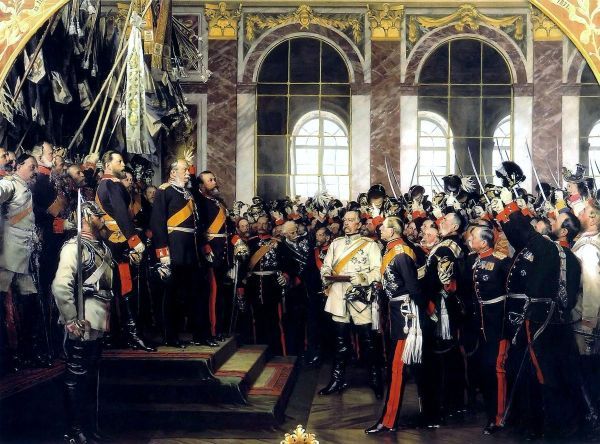
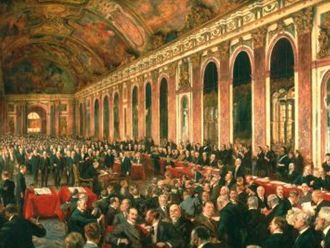
There was an arguable
case for Alsace and Lorraine were returned to French control, but it should be
pointed out that this region was not as unequivocally French as has generally
been stated – by the beginning of the 20th century, less than 12 percent of the population spoke French as
their first language.1 Even at the time of the Franco-Prussian War,
Francophones made up less than half of the overall population. However, the
anger in Germany at the loss of these territories was far less than the
resentment at the French occupation of the Saar region of Germany. The French
had demanded this area as a territorial acquisition during the abortive peace
talks between Vienna and Paris, and there was a considerable concern in Germany
that the French occupation of the Saar might become permanent.
The loss of territory
in the east was also the source of great resentment. Two Baltic cities – Memel,
to the north of East Prussia, and Danzig, to its west – were removed from
German control, even though the majority of their population was unequivocally
German. In both cases, the surrounding countryside was predominantly
non-German, and as has already been described, the Lithuanians took advantage
of this to seize the entire Memelland region and gain
access to the Baltic. The Poles were keen to secure control of Danzig, but
although Woodrow Wilson had assured the Poles that he supported the right of
the new Poland to have a Baltic port, he had likely intended this to be by
union with Lithuania. Instead, Danzig was declared a
free city, and the Poles were given control of a corridor of land running
past Danzig to the coast immediately to the north.
Here, they rapidly developed
the minor port of Gdynia into a new maritime center. The existence of this
corridor resulted in East Prussia is left isolated from the rest of Germany.
This region, undeniably German in its history, culture, and population, had
always been a predominantly agricultural area, and there were constant doubts
that it would be able to survive in its new isolated state without one-day
becoming prey for an expansionist Poland. However, when the southern part of
East Prussia – the Masurian region, where there was
heavy fighting in 1914 and 1915 – was offered a plebiscite in 1920 to decide
whether it would be part of Poland or Germany, the result was overwhelmingly in
favor of the latter. The Poles protested that there had been widespread
intimidation by German police and paramilitary groups, and that results had
been falsified, but it seems that many Poles genuinely preferred to be part of
Germany rather than Poland; the vote took place in July when there was a
genuine threat of Tukhachevsky’s armies reaching Warsaw, and many may have felt
that they would be safer under German control rather than potentially once more
being under the Russian yoke.
All along the eastern
fringes of the new Germany, there were substantial
German-speaking communities in the modern nations of Europe – in Poland,
the Baltic States, the Sudetenland, and Bohemia. Even in Transylvania, there
were tens of thousands of descendants of Saxon settlers who had lived in the
region for hundreds of years. The status of Danzig was unsatisfactory to its
citizens, to Poland, and Germany. Once memories of the terrible cost of the war
began to fade and were no longer strong enough to be offset against the
continued perceived grievances of the Treaty of Versailles, it was almost inevitable
that many in Germany would seek opportunities to put right what they regarded
as abiding injustices. The willingness of a future generation to exploit
grievances both real and imagined made a second all-engulfing war inevitable.
The Austro-Hungarian diplomat Czernin summed up
events with considerable prescience in 1919:
The Council of Four at
Versailles [France, Britain, Italy and the United States] tried for some time
to make the world believe that they possessed the power to rebuild Europe
according to their ideas… That signified, to begin with, four utterly different
purposes, for four different worlds were comprised in Rome, Paris, London and
Washington… Wilson has been scoffed at
and cursed because he deserted his program; indeed, there is not the slightest
similarity between the Fourteen Points and the Peace of Versailles… Clemenceau,
too, the direct opposite of Wilson, was not quite open in his dealings.
Undoubtedly this older man, who now at the close of his life was able to
satisfy his hatred of the Germans of 1870, gloried in the triumph; but, apart
from that, if he had tried to conclude a ‘Wilson peace,’ all the private
citizens of France, great and small, would have risen against him, for they had
been told for the past five years, queues boches
payment tout [‘that the Germans will pay for everything’]. What he did, he
enjoyed doing; but he was forced to do it, or France would have dismissed
him. … And thus there came about what is
now a fact. A dictated peace of the most terrible nature was concluded and a
foundation laid for a continuance of unimaginable disturbances, complications,
and wars… The Entente, who kept up the
blockade for months after the cessation of hostilities, has made Bolshevism a
danger to the world. War is its father, famine its mother, despair its
godfather. The poison of Bolshevism will course in the veins of Europe for many
a long year.
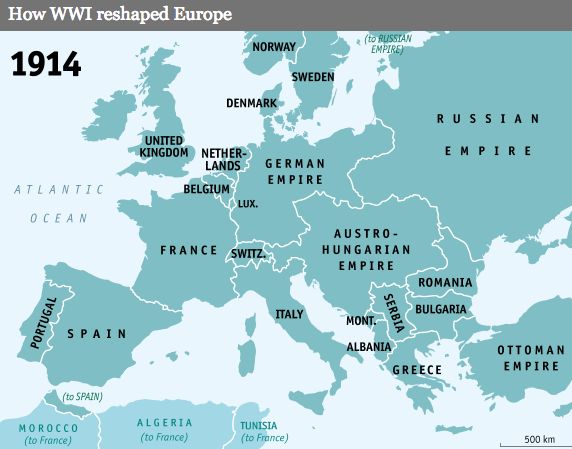
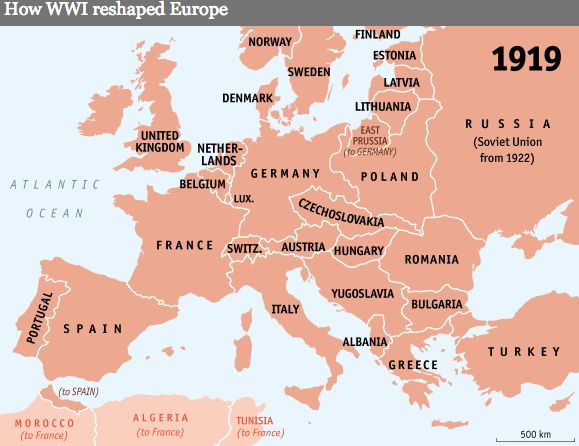
Versailles is not the
end of the war; it is only a phase of it. The fight goes on, though, in another
form. I think possible that the coming generation will not call the high drama
of the last five years the World War, but the World Revolution, which it will
realize began with the World War.2
The closing comments
highlight the widespread preoccupation in Europe with the threat of Bolshevism.
Lenin, Trotsky, and others had always made clear their intent to export their
revolution to the rest of the world, and while the war between Russia and Poland
brought the first, forcible attempt to do this to an abrupt halt, Soviet
doctrine remained unchanged. Even if the threat gradually became more
ideological than the military, the fear of Bolshevism was exploited by those
who wished to play upon the concerns of the ‘bourgeoisie’ who had the most to
lose from the communist government. While the National Socialists in Germany
were amongst the leading exponents of exploiting such fears; they were by no
means alone. Both the Nazis and the Italian fascists demanded antidemocratic
powers as a necessary means of holding back socialism, and such sentiment
spread to non-fascist countries such as the Baltic States and Poland. The
post-war legacy of ethnic minorities on the wrong sides of Europe’s new borders
became intermingled with pre-war thinking about social Darwinism and racial
superiority; not only was it essential to reunite the lost populations with
their homelands, but it was also vital to save them from oppression by races
that were seen as inferior. Even within Bolshevik Russia, there was widespread
prejudice against certain nationalities. After coming to power, Stalin – who
was a Georgian – rapidly implemented a policy of enforcing Russification,
classifying some communities within Russia as ‘enemy nations’. Once assigned
this title, members of these communities – Poles, Germans, Koreans, Chinese,
Kurds, Iranians, Finns, Estonians, Latvians and Lithuanians by ethnicity – were
subject to forcible relocation, arbitrary arrest, and even summary execution.3
For many in Germany,
there was an additional factor: the tantalizing sense that German domination of
Eastern Europe almost became a reality after the Treaty of Brest-Litovsk. While
there was a case for saying that the German Army had been defeated in the west,
it was unarguable that it had prevailed in the east. Also, the soldiers who served with Goltz in Latvia
returned home feeling that they had been promised land in return for their
service; there was a widespread sense of entitlement, which combined with the
notion of German superiority to the Slav people of the region to make many
believe that the Western Powers had cheated
Germany of its rightful gains in the east. If the opportunity arose,
Germany would attempt to make the territorial gains that were snatched away at
the end of the war, not least because
the specter of blockade and starvation had to be avoided in a future conflict;
given British control of the seas, this was possible only if Germany controlled
a vast land-based empire in the east.
Inevitably, many in
Germany attempted to analyze why their mighty army had failed to win the war.
The legend of the invincible army, stabbed in the back by treacherous
politicians and left-wing agitators, was popular with the officer corps in
particular, not least because it absolved them of all blame. Writing many years
later, Hermann Balck gave a somewhat more
sophisticated analysis. There was no question of Germany continuing the war in
the context of the loss of the Romanian
oilfields and the collapse of the k.u.k. Army;
even if Austria-Hungary had been propped up, the vast resources of the United
States would have brought defeat.
Like all the Great
Powers, Germany entered the war with considerable unity and enthusiasm. Still,
as Balck pointed out, this was unlikely to last, and
the political leadership of Germany – the civilian politicians and the kaiser –
did not do enough to ensure that the nation remained united in its pursuit of
victory. Decisions about democratic reforms were postponed until after the
successful conclusion of the war, an error that merely led to disaffection and
growing demands for immediate change. Nevertheless, Balck
also concluded that the German Army was not blameless. The extravagance and
glitter of the early years of Kaiser Wilhelm’s reign alienated many of the
Prussian officer corps, who increasingly turned their backs on politics and
concentrated on purely military matters, a tendency that would cost them dearly
in the Second World War. Balck felt that if Germany
were to win the war, victory had to be achieved in the first years of the war.
Still, despite the constant talk of conflict in the early years of the 20th
century, Germany was ill-prepared for a war that would find it pitched against
multiple opponents. The massive expenditure on the German Navy achieved nothing
other than alienating Britain and diverted precious resources and workforce
from the German Army. Once the war began, there were repeated errors: Balck was particularly critical of Falkenhayn’s strategy,
and felt that Hindenburg and Ludendorff were sidelined for too long.4
Like many reviews
written in the decades that followed, Balck’s opinions are not without merit
but are also selective. There can be no question that the war was lost by early
1918, and there was almost no possibility of the great offensive launched in the
west, bringing about a decisive victory before the immense power of the United
States intervened. But to point out the mistakes that Germany made in the years
before the war and once the conflict began is to ignore similar mistakes made
by Germany’s opponents. While Falkenhayn might have made errors, the commanders
of other armies also miscalculated repeatedly. Ultimately, the war was lost
because Germany and its allies did not have the resources of their
enemies.
The disintegration of
the national sense of unity that took Germany to war was more due to the
enormous pressures placed upon Germany by its enemies than due to negligence by
domestic politicians.
Even in the first
months after the Treaty of Versailles was signed, there were apparent
differences of opinion about whether it had achieved its aims. The British view
was that the destruction of Germany’s fleet had primarily achieved its war
aims. Still, despite Czernin’s condemnation of
Clemenceau, there was considerable dismay in France that the terms were not
harsh enough. The Italians had explicitly entered the war with significant
territorial gains as the price. Although they achieved some of these, others –
particularly the Dalmatian coast – were not granted to them. In the years that
followed, Germany proved incapable of paying reparations on the scale demanded,
leading first to the military occupation of the Ruhr and then to the
cancellation of payments entirely. David Lloyd George, who played a significant
part in the negotiations on behalf of Britain, later wrote an evaluation of the
treaty in which he concluded that it had not removed the military threat
permanently from Germany, and was critical of the manner in which Germany was
treated.5
The issue of
reparations had dominated thinking about the shape of a peace treaty during the
war, not least because of how Germany had imposed reparations on France in
1871. The Germans blamed the collapse of their economy on the punishing
payments that were demanded by the French and Belgians, and whilst it would be
wrong to blame the period of hyper-inflation entirely on reparations, they
certainly contributed to the problems of Germany as it attempted to recover
from the war. John Maynard Keynes, the British economist, criticized the treaty as being fundamentally unfair.
Europe, if she is to
survive her troubles, will need so much magnanimity from America, that she must herself practice it.
It is useless for the Allies, hot from stripping Germany and one another, to
turn for help to the United States to put the states of Europe, including
Germany, on their feet again. If the general election of December 1918 [in
Britain] had been fought on lines of prudent generosity instead of imbecile
greed, how much better the financial prospect for Europe might be.6
Others took a
different view. A leading French economist suggested that by restricting
Germany to a small army, the treaty allowed Germany to divert funding towards
reparations in an affordable manner; others pointed out that the terms were far
more lenient than those that Germany had intended to impose upon its enemies in
the event of a German victory.7
Regardless of whether the financial terms were too severe, it is
difficult to imagine a peace settlement that would have satisfied French and
Belgian demands for reparations and the general desire to weaken Germany militarily, and at the same time
would not have left Germany with a great sense of grievance that could then be
exploited by German politicians for their own ends. In a letter to a friend
written in 1920, Balck mused on the failings of
different parts of German society and made a prophetic statement:
Just like the German Bürgertum [the bourgeoisie], we too, unfortunately, must
strike our Christian religion, at least in its current state, from the list of
factors that can rebuild Germany. The church also has failed. The powerful
force of Christian teachings has been watered down and is heading in the wrong
direction. Our times are screaming for a reformer or a new religion. Socialism
is nothing but the dissatisfaction of the masses on a religious level. 8
For a nation with
little experience of democratic government, it was almost inevitable that
enthusiasm for such new concepts would soon be replaced by disillusionment,
especially in the context of a nation humiliated by defeat and struggling with
worsening financial circumstances. The lure of a strong man with dreams of
reborn nationalism was almost irresistible, and, for a generation brutalized
both at home and in the front line by a terrible conflict, the associated
violence and racism did not raise the concerns and outrage that might otherwise
have prevailed.
It is unarguable that
the roots of the Second World War lay in the imperfect peace that was
established in Europe after the First World War. But such a simple statement
ignores many other factors. Many nationalities were allowed to develop their
states, and Europe was too exhausted to continue fighting until German military
power was unequivocally destroyed – in the absence of such a conclusive defeat,
the terms imposed resulted in perhaps the ‘least worst’ outcome. The world
would have to wait for another war with all its attendant horrors before the
imbalances created in the wake of the First World War were resolved. Still,
while the Second World War settled some issues, it created many more, leaving
Europe divided into two armed camps in a stand-off that would last for over 40
years. While some nations are dragged unwillingly into conflict, those that
enter it in the hope of resolving their problems find that they have merely
exchanged one set of issues for another – and at enormous cost.
In some respects, the
First World War belongs more to the 19th century than the 20th century. It was
a conflict with imperial monarchs, the widespread use of cavalry, and statesmen
who believed that they could arbitrarily redraw the maps of the world. The
events that triggered the outbreak of war show a disastrous failure of
deterrence. Yet, decades later, when Europe was once more armed to the teeth
and divided into two hostile, mutually suspicious camps, deterrence proved to
be effective at preventing war.
Although it was never
as isolationist as some have claimed, the United States turned inward soon
after the Paris Peace Conference. Congress rejected the Treaty of Versailles
and, by extension, the League of Nations. It also failed to ratify the
guarantee given to France that the United Kingdom and the United States would
come to its defense if Germany attacked. Americans became all the more insular
as the calamitous Great Depression hit and their attention focused on their
domestic troubles.
The United States'
withdrawal encouraged the British-already
distracted by troubles brewing in the empire-to renege on their commitment to
the guarantee. France left to itself, attempted to form the new and
quarreling states in Central Europe into an anti-German alliance, but its
attempts turned out to be as ill-fated as the Maginot Line in the west. One
wonders how history might have unfolded if London and Washington, instead of
turning away, had built a transatlantic alliance with a strong security
commitment to France and pushed back against Adolf Hitler's first aggressive
moves while there was still time to stop him.
Perhaps the cultural
memory of the vast waste of the First World War helped the nations of the
world, even if only to a limited extent, from making similar miscalculations
during the nuclear age.
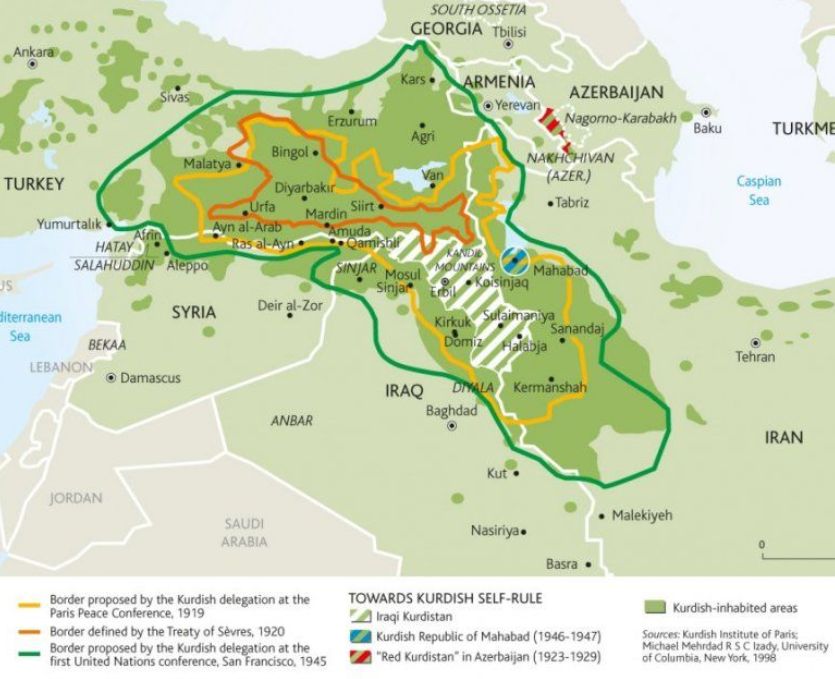
What is more, as we
will see next Turkish pundits today are looking ahead to more serious
foreign-policy challenges, like what will happen in 2023 when the Treaty of
Lausanne expires and Turkey’s modern borders become obsolete. In keeping with
secret articles* signed by Turkish and British diplomats at a Swiss lakefront
resort almost a century ago, British troops will reoccupy forts along the
Bosphorus, and the Greek Orthodox patriarch will resurrect a Byzantine
ministate within Istanbul’s city walls.
As mentioned at the
start, the 1920 Treaty of Sèvres, carved the carcass
of the Ottoman Empire into a number of nation-states, including a “Kurdish
State of the Kurds…east of the Euphrates, south of the southern boundary of
Armenia as it may be hereafter determined, and north of the frontier of Turkey
with Syria and Mesopotamia.” It would, said Winston Churchill, Britain’s
minister of colonies, be “a friendly buffer state” between Turks and Arabs.
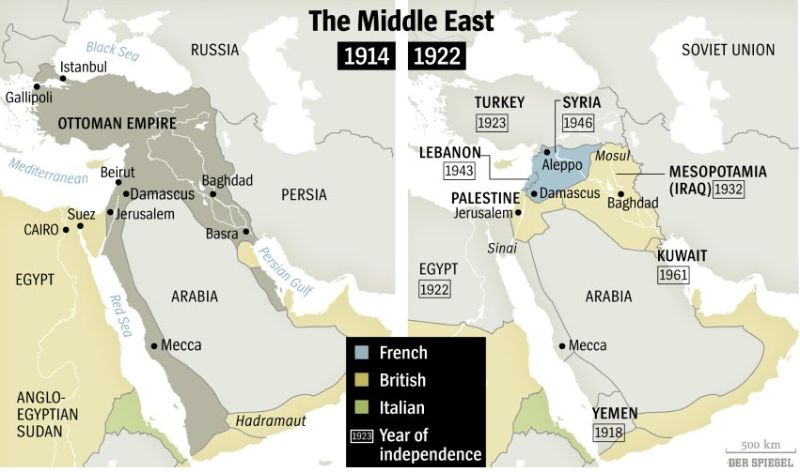
But the Turks fought
back, making enough trouble that the U.S. supported a new treaty in 1923, the
Treaty of Lausanne. The Treaty of Lausanne allowed the British and French to
carve off present-day Iraq and Syria, respectively, for themselves. But it made
no provision for the Kurds.
The Treaty of Lausanne and the Mosul question
In 1922, Turkish
President Mustafa Kemal Ataturk dispatched his foreign minister, Mustafa Ismet Pasha,
to Lausanne to save the fledgling Turkish republic from the jaws of voracious
European colonialists. Two years earlier, the Treaty of Sevres had dismembered
the Ottoman Empire, ceding big chunks of territory to the leading Allied powers
along with the Greeks, Armenians, and Kurds. Deeply traumatized, Turkey, under
the nationalist command of Ataturk, was determined to return to the negotiating
table, not as a supplicant but as Europe's equal, to re-carve its post-colonial
boundaries in the 1923 Treaty of Lausanne. Though the country regained control
of Anatolia and the strategic straits through the deal, Turkey left some
critical unfinished business at Lausanne: the former Ottoman vilayet of Mosul.
The Turks demanded
that the British, represented by Foreign Secretary Lord George Nathaniel
Curzon, return the expansive territory, which stretched from Anatolia beyond
the mountains of upper Kurdistan. From there, it followed the Tigris southeast
from the Sinjar Mountains near the Syrian border, across the Nineveh plain
through Mosul to Arbil and Kirkuk before butting up against the Zagros
Mountains along the Iranian border. Ismet Pasha insisted that this swath of
land was the natural dividing line between Anatolia and Mesopotamia, a
strategic frontier where most inhabitants were intricately bound with Turkey by
trade, tongue, and culture. "Mosul has become more closely connected …
with the ports of the Mediterranean than with those of the Persian Gulf,"
he argued. The region's oil wealth, in no small part, influenced the Turks'
interest in Mosul. At the same time, they were also trying to extend the
strategic depth of their new republic as far as possible, knowing that an array
of adversaries could pit ethnic minorities in the Turkish periphery against the
newborn state.
Under the Ottoman
Empire, the Mosul vilayet stretched from Zakho in
southeastern Anatolia down along the Tigris River through Dohuk, Arbil, Alqosh, Kirkuk, Tuz Khormato and Sulaimaniyah before butting up against the western slopes
of the Zagros Mountains, which shape the border with Iran. This stretch of
land, bridging the dry Arab steppes and the fertile mountain valleys in Iraqi
Kurdistan, has been a locus of violence long before the Islamic State arrived.
The area has been home to an evolving mix of Kurds, Arabs, Turkmen, Yazidis, Assyro-Chaldeans, and Jews, while Turkish and Persian
factions and the occasional Western power, whether operating under a flag or a
corporate logo, continue to work in vain to eke out a demographic makeup that
suits their interests.
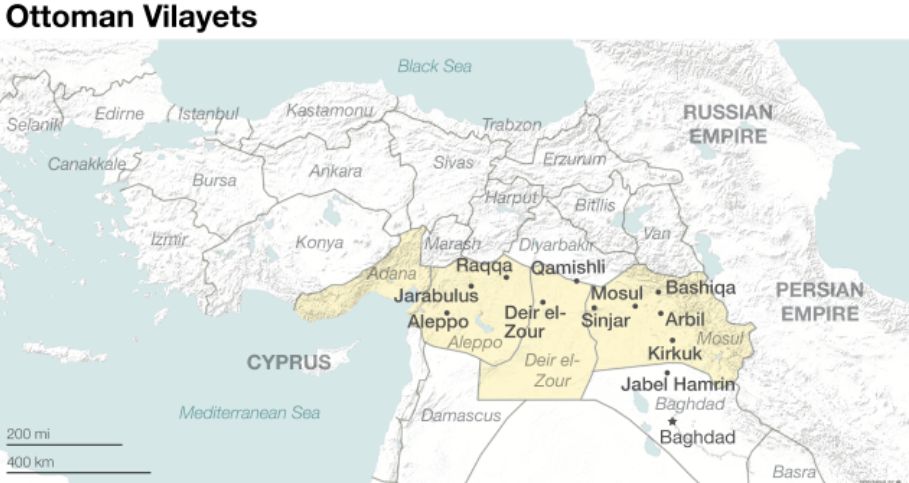
Lord Curzon, armed
with his own demographic and ethnographic studies, struck down the Turkish
argument at every turn. London could not afford to let the threat of Turkey's
expansionism thwart its own goal of establishing a strategic foothold in
Mesopotamia and monopolizing the region's energy resources. Looking at the
region demographically, Lord Curzon saw the Mosul vilayet as a land full of
Arabs and ethnic minorities who were more willing to fight the Turks than to
assimilate with them. "Why should Mosul city be handed back to the Turks?
It is an Arab town built by Arabs. During centuries of the Turkish occupation
it has never lost its Arab character," he maintained. He also insisted
that the Turkish argument for a natural mountainous buffer along the
Sinjar-Mosul-Arbil-Kirkuk line was disingenuous:
"Ismet Pasha has
suggested that the Jebel Hamrin will make a good defensive boundary. But it is
well known that this is not a great range of mountains, but merely a series of
rolling downs. Is it not obvious that a Turkish army placed at Mosul would have
Baghdad at its mercy, and could cut off the wheat supply almost at a moment's
notice? It could practically reduce Bagdad by starvation."
Ismet Pasha, known
for driving Lord Curzon mad with his penchant for wearing earplugs while his
British counterpart spoke, responded with utmost innocence:
"Turkey, which
has now ceased to be an Empire and become a national State, cannot think of
attacking and conquering a country whose population belongs to a different
race… [T]he Turkish and Arab people who have lived together like brothers for
centuries would obviously never think of attacking each other when left to
themselves."
The Oil Factor
As described by
Martin Gibson, Britain's Quest For Oil: The First World War and the Peace
Conferences, 2017 and Dag Harald Claes, The Politics of Oil: Controlling
Resources, Governing Markets and Creating Political Conflicts, 2018 and Anand Toprani, Oil
and the Great Powers: Britain and Germany, 1914 to 1945, 2019. Oil had little
direct impact on military strategy at the beginning of the war, but that the
lessons of the war made oil important in war aims from 1918 onwards and in
post-war diplomacy. The Allies benefitted from having more oil than the Central
Powers, but their supplies were never secure. Britain's prewar policy of
building up stocks in peacetime and buying on the market in wartime was shown
to be flawed by an oil crisis in 1917. The war showed that Britain had to
control its own supplies in the future; doing so became a post-war aim in 1918.
Britain's power and
prestige were based on its naval supremacy; British dominance of naval fuel
bunkering was a key factor in this. Britain had substantial reserves of coal,
including Welsh steam coal, the best in the world for naval use, but little
oil. Britain's oil strategy in 1914 was to build up reserves cheaply in
peacetime and to buy on the market in wartime. An oil crisis in 1917 showed
that this was flawed and that secure British controlled supplies were needed.
The war created an opportunity for Britain to secure substantial oil reserves
in the Middle East. Attempts to obtain control of these affected the peace
treaties and Britain's post-war relations with its Allies. The USA was then the
world's largest producer and was the main supplier to the Allies during the
war. It believed, wrongly, that its output would decline in the 1920s and
feared that Britain was trying to exclude it from the rest of the world. France
also realized that it needed access to safe and reliable supplies of oil.
The largest available
potential oilfield was in the Mosul vilayet, part of the Ottoman Empire in
1914, and now part of Iraq. The 1916 Sykes-Picot Agreement allocated about half
of Mosul to France, which in 1918 agreed to include
all of it in the British mandate territory of Iraq in return for a share of the
oil and British support elsewhere. Other disagreements delayed an Anglo-French
oil agreement, but one was finally signed at San Remo in 1920. It was followed
by the Treaty of Sèvres with the Ottoman Empire,
which appeared to give Britain all that it wanted in the Middle East.
The problems with
Faisal becoming King of Irak made Churchill wonder if
it was worthwhile for Britain to stay in Iraq. He told Lloyd-George in
September 1922 that the threat from Turkey meant that extra troops had had to
be kept at Mosul, meaning that expenditure was greater than planned. Problems with
the USA had prevented the development of the oil. He suggested that Britain
should give Faisal an ultimatum that it would leave unless he agreed to
Britain's terms. Whether Britain left entirely or held onto Basra was less
important. Lloyd George wanted to stay, putting Mosul's oil forward as a reason
to do so.
The resurgence of
Turkey under Mustafa Kemal meant that a new treaty had to be negotiated at
Lausanne in 1923. Sèvres angered the USA since it
appeared to exclude US oil companies from Iraq. For a period Britain focused on
the need to have a large British controlled oil company, but it was eventually
realized that control of oil-bearing territory was more important than the
nationality of companies. This allowed US oil companies to be given a stake in
Iraqi oil, improving Anglo-American relations. Britain's need for oil meant
that it had to ensure that the Treaty of Lausanne left Mosul as part of the
British mandate territory of Iraq. Turkey objected, but the League of Nations
ruled in Britain's favor. Britain had other interests in the region, but most
of them did not require control over Mosul. Mosul's oil gave Britain secure
supplies and revenue that made Iraq viable without British subsidies. By 1923
Britain had devised a coherent strategy of ensuring secure supplies of oil by
controlling oil-bearing territory.
The Secret articles of the Treaty of Lausanne myth
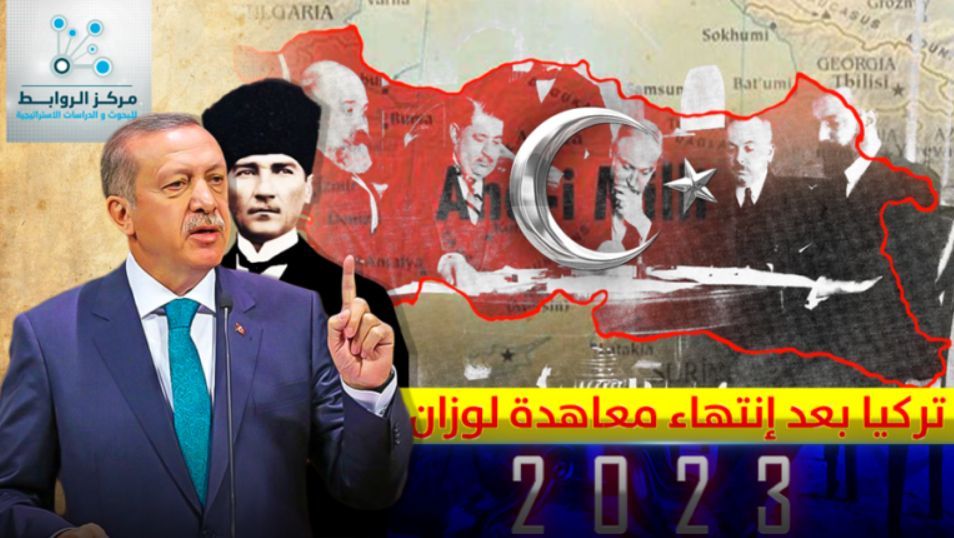
At the time of the
British negotiation with the Ottomans over the fate of the Mosul region,
British officers touring the area wrote extensively about the ubiquity of the
Turkish language, noting that "Turkish is spoken all along the high road
in all localities of any importance." This fact formed part of Turkey's
argument that the land should remain under Turkish sovereignty. Even after the
1923 signing of the Treaty of Lausanne, in which Turkey renounced its rights to
Ottoman lands, the Turkish government still held out a claim to the Mosul
region, fearful that the Brits would use Kurdish separatism to further weaken
the Turkish state. Invoking the popular Wilsonian principle of
self-determination, the Turkish government asserted to the League of Nations that
most of the Kurds and Arabs inhabiting the area preferred to be part of Turkey
anyway. The British countered by asserting that their interviews with locals
revealed a prevailing preference to become part of the new British-ruled
Kingdom of Iraq.

As for the above secret
articles signed by Turkish and British diplomats at a Swiss lakefront
resort almost a century ago, British troops will reoccupy forts along the
Bosphorus, and the Greek Orthodox patriarch will resurrect a Byzantine
ministate within Istanbul’s city walls. On the plus side for Turkey, the
country will finally be allowed to tap its vast, previously off-limits oil
reserves and perhaps regain Western Thrace.

Of course, none of
this will actually happen. The Treaty of Lausanne has no secret expiration
clause. But it’s instructive to consider what these conspiracy theories,
trafficked on semi-obscure
websites
and second-rate news
shows, reveal about the deeper realities of Turkish foreign policy,
especially under President Recep Tayyip Erdogan’s pro-Islam Justice and
Development Party (AKP).
As we have seen above
after defeating the Ottoman Empire in World War I, Britain, France, Italy, and
Greece divided Anatolia, colonizing the territory that is now Turkey. However,
Mustafa Kemal Ataturk reorganized the remnants of the Ottoman army and thwarted
this attempted division through shrewd diplomacy and several years of war.
Subsequently, the 1923 Treaty of Lausanne recognized Ataturk’s victory and
established the borders of modern Turkey. Lausanne then became part of the
country’s foundational myth. For a time it even had its own holiday, Lausanne
Day, when children dressed in costumes representing contested regions of
Anatolia for elementary school plays.
With the Treaty of
Lausanne, so embedded in the Turkish state’s ideology, it is no surprise that
conspiracies about it are ideologically loaded and vary according to the
partisan affiliation of the individual conspiracy-monger. Erdogan’s critics
tend to be more focused on the risks Turkey faces when Lausanne expires.
Conspiracy-minded secularists have always
worried that Erdogan is working with the European Union to establish an
independent Kurdistan or perhaps dig a new Bosphorus to secure American ships’
access to the Black Sea, or really doing anything else possible to undermine
the sovereignty Ataturk secured for Turkey. Some of Erdogan’s supporters, by
contrast, are more optimistic about Lausanne’s expiration, in part based on a
strain of recent historical revisionism suggesting that Ataturk actually could
have gotten a much better deal during the negotiations had he not been in
league with the Europeans — not preserved the whole Ottoman Empire,
necessarily, but at least held on to a bit more of Greek Thrace and maybe the
oil fields of Mosul. Where Ataturk once criticized the Ottoman sultan for
failing to defend Turkish territory in the face of Western aggression,
Islamists have now borrowed this charge for use against Ataturk.
In the realm of
Turkish domestic politics, talk about “the end of Lausanne” reflects the fears
of some and the hopes of others that with former prime minister, now president,
Erdogan’s consolidation of power over the last decade, Turkey has embarked on a
second republic — what Erdogan calls “New
Turkey.” Supporters believe this new incarnation of the Turkish state will
be free of the authoritarianism that defined Ataturk’s republic; critics worry
it will be bereft of Ataturk’s secularism.
Still, the
persistence of the end-of-Lausanne myth shows the extent to which New Turkey
will be indebted to the ideology of the old one. Turkish Islamists have
certainly inherited the conspiratorial nationalism found among many
secularists, complete with the suspicion of Euro-American invasions and
Christian-Zionist plots. (Is it any coincidence Lausanne is in Switzerland, a
center of world Zionism?) While the secularist fringe speculated that Erdogan
was a secret Jew using moderate Islam to weaken Turkey on Israel’s borders,
many in the AKP’s camp now imagine that all Erdogan’s problems are caused by
various international conspiracies seeking to block Turkey’s meteoric rise.
In the realm of foreign
policy, though, these conspiracies belie a deeper truth: Despite the current
violence to Turkey’s south, the borders enshrined in the Treaty of Lausanne are
more secure than they have ever been. And the AKP was the first government to
fully realize this. While Erdogan has often stoked nationalist paranoia for
political gain, as when he claimed foreign powers were behind popular
anti-government protests, the AKP’s foreign policy was the first to reflect a
serious awareness of Turkey’s newfound political and economic power, not to
mention the security that comes with it. Beneath all the bizarre rhetoric and
paranoia, the AKP realized that Turkey has finally moved beyond an era in its
foreign policy defined by the need to defend what was won at Lausanne.
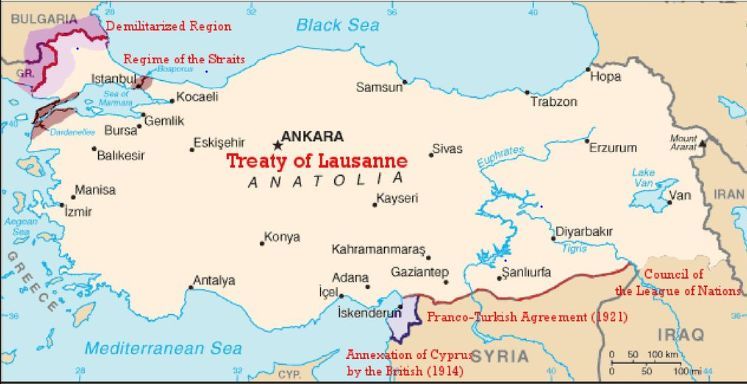
After the Treaty of
Lausanne was signed, Turkey’s main geopolitical aim was the preservation of its
territorial integrity. In the 1920s and 1930s, the threat came from European
powers like fascist Italy. In response, Turkish statesmen embraced perilous neutrality,
controversially staying out of World War II from fear that joining either side
would invite a Russian or German invasion. During the Cold War, the Soviet
Union emerged as a uniquely imminent threat, leading Turkey to abandon its
neutrality and join NATO.
When the Cold War
ended, a new threat to Turkey’s borders emerged: a guerrilla war launched by
the Kurdistan Workers’ Party (PKK). This threat helped unite Turkey with Israel
over a shared belief that comfortable Western liberals would never understand why,
in a dangerous neighborhood, killing terrorists, be they Kurdish or
Palestinian, took precedence over human rights. In fact, Turkey entered the
21st century much like Israel: a regional power with a self-perception based on
the fear and insecurity that circumscribed its founding. Amid fevered criticism
of the war in Gaza this summer, it was striking to see a few Turkish
writers offer advice to Israel about the benefits Turkey has found in
overcoming this self-perception.
American observers
often forget that when the AKP came to power in 2003, almost all of Turkey’s
borders, not just the Middle Eastern ones, were potential hot spots. War with
Greece seemed like a real possibility, not to mention with Iran, Syria, Iraq,
or Armenia. Ahmet Davutoglu, then foreign minister, now prime minister, set out
to change this with his signature, if awkwardly translated “zero problems with
neighbors” policy. With the Arab Spring and Syrian uprising having undermined
many of Davutoglu’s accomplishments by creating a host of new problems, it has
been easy to mock this policy for its naiveté. That response ignores the real
benefits the policy delivered to Turkey, particularly on the heels of an era
when Turkey’s fear-driven approach to regional issues sometimes seemed,
instead, like one of “maximum problems with neighbors.”
Among other things,
Davutoglu honed a more diplomatic language appropriate to Turkey’s new power
and ambitions. For example, rather than responding with nationalistic brio to
hostile questions about Turkish claims on the Aegean Sea from Greek sometimes-adversaries,
he would, instead, gently defuse these Balkan bombs by gracefully suggesting
the real question was “how do we make the Aegean a sea of peace?” Turkey,
Davutoglu deftly suggested, had left such petty Balkan disputes behind and had
moved on to more important things. Like making money.
Indeed, sometimes
underneath all the ideological bluster, Erdogan’s government was accused of
being a little too eager to capitalize on Turkey’s new position of economic
strength. Ironically, during the recent war in Gaza, Erdogan’s opponents
criticized his rhetoric toward Israel not as too harsh but as too hollow.
Secular and Islamist critics alike took great joy in pointing
out that while Erdogan has become an outspoken critic of Israel,
Turkish-Israeli trade has nevertheless steadily increased during the AKP’s time
in office, with Erdogan’s son playing a key role. It is a telling sign of the
shift in Turkey that where once the Turkish military worked to maintain good
Turkish-Israeli relations behind the scenes amid public spats, now that role
had been assumed by the Turkish business community.
Ankara was reluctant
to join the West’s anti-Qaddafi coalition in 2011, for example, in large part
because Turkish businessmen had been doing brisk business in Libya to the tune
of almost $10 billion during the previous year. When civil war broke out in Syria
shortly after the uprising in Libya began, Erdogan and Davutoglu were eager to
be on the right side of history from the beginning, and, likely, were also a
little embarrassed that improved ties with Bashar al-Assad’s regime were one of
the most prominent and profitable achievements of the “zero problems” policy.
Now, a stronger,
wealthier Turkey has discovered some of the challenges that a strong, wealthy
country can face. Americans might even recognize a few. The Arab Spring
revealed that undemocratic regimes only make great business partners until they
are overthrown. An exaggerated sense of confidence also led Turkey to take such
an active role in supporting anti-Assad rebels in Syria without fully
considering potential blowback. Turkish voters are now questioning their
country’s role in this violent quagmire, especially after Islamic State
militants, seemingly ungrateful for Turkey’s previous patronage, kidnapped and
held dozens of Turkish citizens working in the country’s consulate in Mosul,
Iraq.
Plus now with renewed
conflicts involving situations like the Syrian
Democratic Forces (SDF) who are led by the Kurdish People's Protection Units
(YPG) and its more recent involvement in Libya foreign policy will be
judged by whether it can continue to translate Turkey’s abstract geopolitical
security, those Lausanne borders still
aren’t going anywhere, into personal safety and stability for Turkish citizens.
In short, Erdogan and will face plenty of challenges even without having to
renegotiate the Treaty of Lausanne.
But all this attests
to the fact that things like the centennial of the Treaty of Trianon on 4 June
2020 (which among others provided for an autonomous Kurdistan) the Treaty of Sèvres on 10 August 2020, or/and the upcoming Treaty of
Lausanne in 2023, which Turkey still believes today that it has " secret
articles" to go in effect in 2023
still have relevance today.
1. Rademacher, M., Reichsland Elsaß-Lothringen
1871–1919 (Osnabrück University, 2006) University thesis available online
2. Count Ottokar Czernin (Austrian serving as Foreign Minister from1916 to
1918), In the world war 1920, 2015, pp. 302–305
3. Terry Martin, The
Affirmative Action Empire: Nations and Nationalism in the Soviet Union
1923–1939 (Cornell University Press, Ithaca 2001), p. 311
4. Hermann Balck (Author), David T. Zabecki (Editor, Translator),
Order in Chaos: The Memoirs of General of Panzer Troops (2015), pp. 128–133
5. David Lloyd
George, The Truth about the Peace Treaties (Gollancz, London 1938)
6. John Maynard
Keynes, The Economic Consequences of the Peace (Harcourt, Brace &
Howe,
New York 1920), pp.
90–91
7. Etienne Mantoux,
Carthaginian Peace, or The Economic Consequences of Mr
Keynes
(Scribner, New York
1952)
8. Balck (2015), p. 137
For updates click homepage here